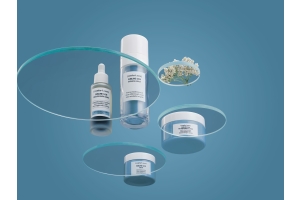Table of Contents
Vitamin C serums are extremely popular anti-aging serums, so it’s no surprise that they’re an essential part of many anti-aging skincare routines. We all know the benefit of Vitamin C on our general health, and it’s logical that such an effect could also be seen on our skin.
Does Vitamin C Serum Actually Work? What Does It Do?
Vitamin C serum can be effective, but its success depends on the quality and concentration of the active ingredient. Scientific studies support its efficacy in reducing wrinkles, evening skin tone, dark spots, and hyperpigmentation while aiding wound healing.
Although sunscreen is still necessary, vitamin C helps protect against pollution, free radicals, and sun exposure.
So, does vitamin C serum work? Yes, it does, but not all serums are created equal, so make sure you use one that will work well with your skin.
Remember, Vitamin C serum benefits can take a few weeks or months to be noticeable. Be patient, and take pictures of your face to see the gradual changes.
Are Vitamin C Serums Good for All Skin Types?
Vitamin C face serum benefits are widely recognized across different skin types. However, specific components, concentrations or active ingredients may better suit particular skin types.
For example, L-ascorbic acid is known to be very effective, but it could be too harsh on very sensitive skin, and the product is not as stable as other types of vitamin C. If you choose this one, make sure it comes in dark bottle packaging, which helps maintain the stability and effectiveness of the serum.
Sodium Ascorbyl Phosphate is also a popular version of the vitamin powerhouse but is less efficient than L-ascorbic acid. This product is more stable and better suited for sensitive or breakout-prone skin. Vitamin C serums can help reduce redness and promote healing on acne-prone skin.
Magnesium Ascorbyl Phosphate is also an ingredient to look for to help acne-prone skin. It is one of the most hydrating types of vitamin C and works great to reduce skin irritations. Its hydrating formula and its antioxidant benefits also do wonders for dry skin.
Vitamin C can help reduce inflammation and promote wound healing without increasing oil production for oily skin.
Is There Any Downside to Vitamin C Serum?
Generally speaking, vitamin C serum side effects are mild or non-existent.
However, vitamin C serum could cause redness, dryness and itchiness if you have sensitive skin. If your skin is reactive, start with a serum with a lower vitamin C dose. You can also choose a type of vitamin C that works better for sensitive skin. You can also use it less often, like only a few times a week.
Vitamin C serum should not cause breakouts in itself, but if you have sensitive or acne-prone skin, the serum could irritate it and cause breakouts. In such cases, using certain types of vitamin C, such as Magnesium Ascorbyl Phosphate for acne-prone skin or Sodium Ascorbyl Phosphate for sensitive skin, could be a solution.
It’s always best to ask a dermatologist for the best solution for your specific skin type.
How to Use Vitamin C Serum
There is no specific moment for when to use Vitamin C serum. It can be used both at night or in the morning.
The moment you apply vitamin C serum to your face will depend mainly on which other products you are using. For example, if you also use a retinol serum, apply retinol at night and vitamin C in the morning since it also provides some protection against the sun. If you only use vitamin C serum, you can use it twice daily.
Unless told otherwise by a professional, vitamin C serum is safe to use daily. If you’re wondering how much to use, a few drops are usually enough.
When to Use Vitamin C Serum in Your Skincare Routine?
Within your skincare routine, applying vitamin C serum on your face after cleansing and before using other hydrating products is best. If you are using a toner, the toner should come first, and then you can apply the serum.
What if It’s Your First Time Using Vitamin C?
Like any new product, you should always try a small amount on your wrist, especially if you have reactive skin. Vitamin C serums are good, but it doesn’t mean that all of them will work with your skin type.
In case of doubt, always ask your dermatologist. Also, like many anti-aging products, read the back of the labels, as the active ingredient list isn’t always crystal clear on the packaging. And remember, it can take a few months to notice the result, so be patient!
Harness the power of Vitamin C serum as your ally in the quest for youthful, vibrant skin. Patience and consistency are key—choose the right serum for your skin type, apply it diligently, and soon you'll notice a transformation that goes beyond the surface, boosting skin’s resilience and radianc







Enter the email associated to your BeautySense account and we'll send you a link to reset your password.